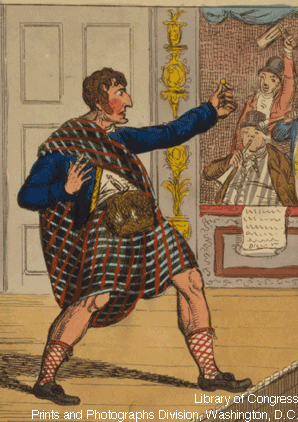Deploying History?
At a recent conference on African Atlantic Culture, History and Performance, one of the keynote speakers encouraged participants to consider how we deploy history. While the word deploy can mean simply “use,” it also has connotations that suggest a more deliberate and even strategic function. As we face new questions concerning open universities and universal access, how do those possibilities change the way we as scholars imagine “deploying” our history and our methodologies? How do we envision the audiences for those new venues deploying history in their own turn? What is the difference between teaching our students to deploy/use history vs. simply absorb/know it? If there is a difference? How might it change the ways we approach our pedagogy and our research? Should it?


{ 5 comments… read them below or add one }
I’ve found doing historical research in theatre productions directly affects the way an actor performs. The more an actor knows the history of anything, whether its the time period of the play, the experiences of the playwright, or even a particular word or turn of phrase, the more confidently an accurately he or she can interpret and contextualize the performance for the audience. To me, that would be a good example of “deploying” history; actively using it to improve performance and to communicate themes and ideas to a broad audience.
I think you raise a great question about the “stakes” and strategies involved in any academic exploration. For me, the metaphor of “deployment” used in the conference keynote I describe above, underscored the interactive (or *hopefully* interactive!) nature of our scholarship. Strategies are most effective (and fun) when we expect engagement and argument, as you note in your posting. So, what are the best ways to use our arguments to engage others? How do we step away from the notion that we have to “prove” things and help students appreciate that the argument itself — knowing how to strategize, how to “deploy” knowledge — is the point?
For “A Wild Bear” on deploying history with performers… Can I ask how transparent you are (to borrow a term from the second reply) about your methods when you work with performers? What do you think they need to know, not only about the material, but about how you compiled it in order to enhance their work?
I have been thinking about these questions a lot lately—I will be teaching theatre history for the first time this fall. My snap (and general) response to your questions would be an approach that points to alternative readings/interpretations/arguments, that emphasizes the “ruptures” in the accepted narrative, and that draws attention to legitimizing discourses and structures. In my performance studies classes I have had success with this approach, particularly in that this process also draws attention to the structures that legitimize my role in the classroom (in this sense, I suggest that it is not so much about deploying arguments as deploying ourselves). Further, this strategy makes it clear that no argument, even (especially) my own, is monolithic, without subjectivity, or without other possible interpretations. This opens the structure of the argument, offers points of access, and (hopefully) makes it less intimidating and more rewarding to engage with. In other words, in making clear how I deploy arguments, I hope to model similar strategies to my students.
In terms of a theatre history class, I am not sure how to speak to these questions. Even without the performance studies framing, I assume that, to an extent, I can work with these same ideas. The speed and span of the history survey class, however, makes me wonder how much time I will be able to devote to this process. It is simply a matter of discussing these issues, and historiography more generally, at the beginning of the semester and then gesturing to it throughout? Or is it better to approach these issues one topic at a time, correlating them with specific (and pointed) moments of theatre history? Is it a combination?
I think that your point about helping students appreciate the argument and the strategizing is key here. While I recognize that this might get be banned from … academia, we are working in an age when the dissemination and memorization of facts is somewhat eclipsed by the speed and accessibility of information on the internet. While this does relieve those burdens from the classroom, I do think that it shifts the focus—now, I think we need to frontload how to find this information, how to evaluate it, and how to deploy it (and their own subjectivities) in their own work.
Again, apologies for begin long winded and that much of what I have written here might just be common sense!
Heather Nathans,
It’s always tricky to find that “sweet spot” of openess and transparency that encourages a performers growth while ensuring that the rehersal process doesn’t get derailed, unfocused or strays from the mission statement. In my experience, such as it is, a great place to find that spot is in the script itself. The performers will already, at the very least, be somewhat familiar with it. They’ll be able to actively participate in discussions about their characters more effectively, and they may identify more with exercises and development when it’s coming from a place that they feel directly concerns them rather than a packet or handout. Certainly, handouts are very useful and the script itself is not the be-all-end-all, but It can give you a little bit of an edge without sacraficing too much control. I suppose that I would be as transparent as I needed to be depending on who I was working with.